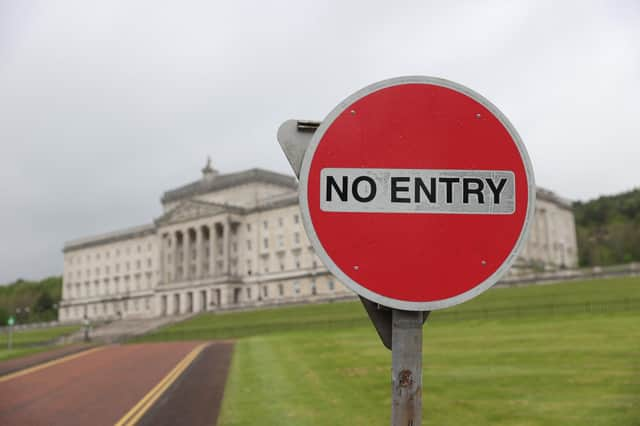Owen Polley: Principle of consent needs restored to Belfast Agreement


Instead, they are likely to make mystical appeals to its ‘spirit’ or ‘context’, which they interpret in a way that matches their political objectives.
Over recent days, we’ve seen two prominent examples of this habit, coinciding with the campaign to force the DUP back into the devolved institutions, before any progress had been made on resolving the Northern Ireland Protocol.
Advertisement
Hide AdAdvertisement
Hide AdFirst, the Alliance Party connived with Sinn Fein and the SDLP to encourage the idea that there could be a form of ‘joint authority’ over the Province between the government and Dublin, if power-sharing at Stormont could not be revived. This was a suggestion that flatly contradicted the contents of the agreement, but one that we’ve seen before.
In 2017, after Sinn Fein collapsed the executive and issued its shape-shifting list of ‘red line’ demands to resume power-sharing, the then taoiseach, Leo Varadkar, claimed that the British Irish Intergovernmental Conference (BIIGC) could act as a form of joint government for Northern Ireland.
In actuality, the southern prime minister could scarcely have distorted the Good Friday deal more thoroughly.
In fact, the BIIGC was set up as part of strand 3 of the agreement, which covered ‘east-west relationships’. It was precluded specifically from discussing Strand 1 matters, which included only issues devolved to Northern Ireland.
Advertisement
Hide AdAdvertisement
Hide AdThe agreement said that the conference should meet to consider, “non-devolved NI matters, on which the Irish government may put forward views and proposals”.
The fact that one of the agreement’s ‘guarantors’ was prepared to misrepresent its contents so blatantly could have caused scandal. But we were already well-used to Dublin politicians acting as if they were part of a nationalist campaign, rather than sensible and serious partners, so it resulted in just a brief news story.
Last week, the current Taoiseach, Michéal Martin, resurrected the notion that the BIIGC ‘kicks in’ if the Stormont institutions don’t operate, though, in fairness he was not crass enough to imply that it could discuss devolved matters.
He did suggest, though, that “there is a legitimate basis for discussion” about replacing the system of mandatory coalition at Stormont. These are the rules that mean an executive can be formed only if both the largest unionist and nationalist parties agree to nominate first and deputy first ministers.
Advertisement
Hide AdAdvertisement
Hide AdThe idea that this system should be reformed is hardly new, but it’s ironic that it has gained momentum now.
In the past, unionists suggested frequently that parties should be allowed to form a ‘voluntary coalition’ so that Sinn Fein could not repeatedly collapse power-sharing. In 2008, when constitutional nationalists were more inclined to reconcile with pro-Union moderates, the former SDLP leader, Mark Durkan, made a speech at Oxford University suggesting some of the ‘ugly scaffolding’ of the Belfast Agreement could eventually be dismantled.
The response from Sinn Fein was apoplectic. Its representatives described Durkan’s proposals as 'disastrous' and implied that unionists couldn’t be trusted to participate in normal politics.
The principle of ‘parallel consent’ was apparently indispensable then, but now the party hints that it’s a bad idea.
Advertisement
Hide AdAdvertisement
Hide AdActually, there are some valid arguments that the system at Stormont has not worked effectively over the decades since 1998.
All devolved institutions have a tendency to blame central government for their problems, while refusing to take difficult or unpopular decisions. But the fact that irreconcilable opponents in Northern Ireland have to take decisions together makes good decision making even more difficult.
At the same time, it's difficult not to see the timing of this debate as sinister. Nationalists and pro-EU liberals are seemingly most concerned with overriding unionists’ valid concerns about the NI Protocol and enforcing their vision of a future where our place in the UK matters less than our links to Brussels and Dublin
The problem with the agreement was never that it prevented one community from imposing major constitutional defeats like this on the other. It was that vital matters of everyday government, like economics or reform of the public sector, became touchstones of identity.
Advertisement
Hide AdAdvertisement
Hide AdThere are many problems with the current system at Stormont and there should certainly be discussions about how things could be done better. The removal of designation and, in particular, the introduction of joint authority, though, are so intrinsic to the agreement that, if they were removed, it would have to be renegotiated or replaced.
It’s a mystery how politicians who are supposed to put such emphasis on this political settlement, and are prepared to invoke it at the least opportunity, can also be so casual about dismantling sensitive aspects of the deal that don’t suit their agenda. At best, it represents double-standards and hypocrisy on a staggering scale.
At the moment, there is no executive at Stormont because of the extraordinary impact of the protocol; not because of designation or the DUP’s attitudes to Sinn Fein. These arrangements put nationalists’ desire to pretend that there is no border ahead of unionists’ right to have Northern Ireland’s place in the UK respected. The agreement is not working because its key tenet, the principle of consent, has been undermined to the point of worthlessness.
If politicians want to reform, repair or replace it, they should start with restoring the principle of consent.